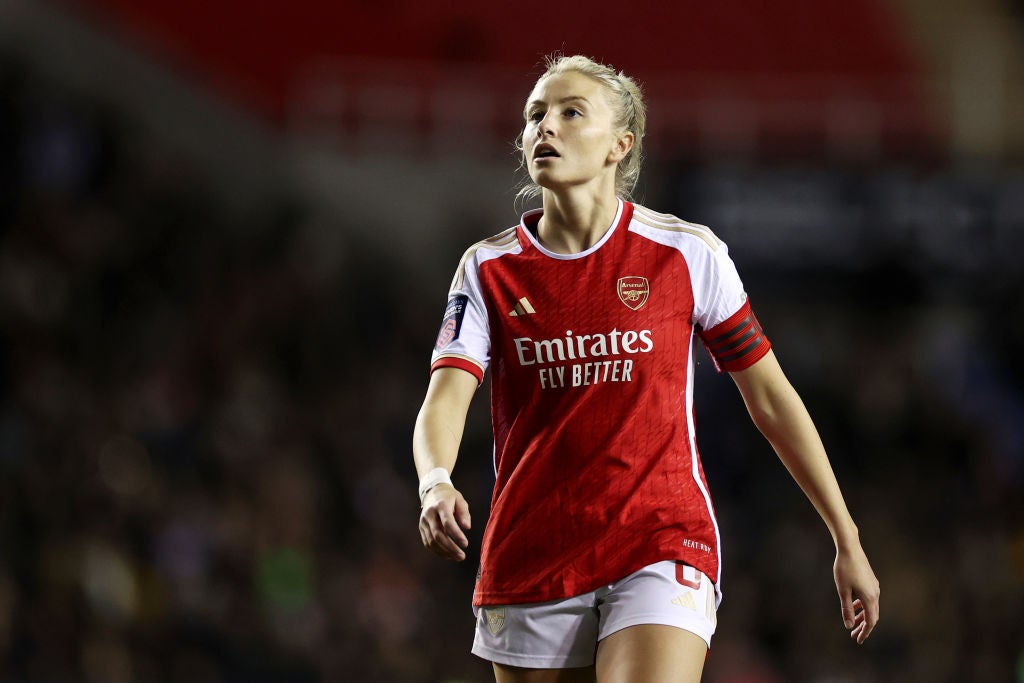Response to ACL crisis in women’s sport ‘disparate and slow’
England skipper Leah Williamson suffered an ACL injury which saw her miss the Women’s World Cup

Sport’s response to the prevalence of anterior cruciate ligament (ACL) injuries among women has been “disparate and slow”, a select committee report has concluded.
A number of top female footballers, including England captain Leah Williamson and her Lionesses team-mate Beth Mead, have suffered ACL injuries, with Arsenal star Williamson sidelined for nine months before she returned to action in January.
The Women and Equalities Committee (WEC) found “systemic gender inequality” in how sports and exercise research is conducted and called on the Government to convene a task force to develop a long-term strategy to tackle sportswomen’s health and physiology-related issues.
“Scrutiny of the ongoing anterior cruciate ligament (ACL) knee injury issue in women’s football has shown that there is systemic gender inequality in sports and exercise research, which is still overwhelmingly conducted by men, looking at issues affecting men,” the report summary stated.
“The sports science sector’s response to the ACL issue has been disparate and slow. We have no doubt that a health issue of similar magnitude affecting elite male footballers would have received a faster, more thorough, and better co-ordinated response.”
European football’s governing body Uefa has set up a women’s health expert panel which is looking at ACL injuries, with the long-term goal being to produce a consensus on prevention and management by the summer, plus an updated ACL injury prevention programme.
A paper published last year in the British Editorial Society of Bone and Joint Surgery found females were up to eight times more likely to suffer an ACL injury than males. Hormonal factors were cited in the paper as a modifier in the increased risk of injury but the paper’s authors accepted data on this topic remained “limited”.
Tuesday’s WEC report pointed to the specific example of football boot design as an example of the inequality between men and women participating in sport.
“While female footballers in the UK have enjoyed great success at club and national level, they have done so wearing ill-fitting footwear,” the report said.
“Few football boots designed for women are available, and those that do exist are rarely stocked or promoted by the UK’s leading high street sports retailers.”
The WEC recommended the Department for Culture, Media and Sport (DCMS) and the Department for Education (DfE) should convene a taskforce to also include representatives from elite sport funding body UK Sport, the UK Sports Institute, women’s health and fitness experts, sport and exercise research institutes and the UK divisions of leading sportswear brands.
A DCMS spokesperson said: “Later this month, the Government will establish a Board of Women’s Sport to share best practices and research across women’s sport, including on issues such as ACL injuries.
“We are supporting women’s sport at every opportunity, from ensuring girls’ equal access to sport in school to investing £325million in grassroots football and multi-sport facilities across the UK by 2025.
“In December, Culture Secretary Lucy Frazer supported the recommendations from Karen Carney MBE’s review of women’s football in full, including holding others to account for action on player welfare.”
Tuesday’s report also called for a “drastic” improvement in how schools teach about girls’ health and physiology, including the menstrual cycle and periods in the context of sport and physical exercise.
The report found “overwhelming evidence” that sports kit can have a “devastating impact” on girls’ confidence to participate in and enjoy school sport, and said focus needed to be on the enjoyment girls derive from sport, not solely on increasing participation.
The report also called for mandatory qualifications for coaches to ensure they are fully educated around female health. It highlighted “deplorable” instances of harmful coaching practices such as public weighing, fat-shaming and bullying in swimming and sport more widely which had “damaged trust” in sports governing bodies.
A sector-wide working group should be established to ensure equal access to maternity pay and leave, and how pregnant women and mothers are supported, the report said.
It also called for the Government’s ‘Get Active’ strategy to be updated to include an analysis of the barriers to participation faced by women in midlife, including perimenopausal and menopausal symptoms.
Subscribe to Independent Premium to bookmark this article
Want to bookmark your favourite articles and stories to read or reference later? Start your Independent Premium subscription today.

Join our commenting forum
Join thought-provoking conversations, follow other Independent readers and see their replies